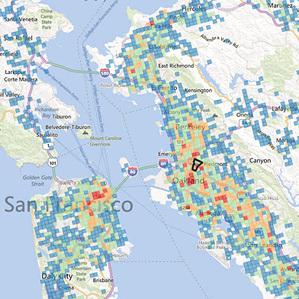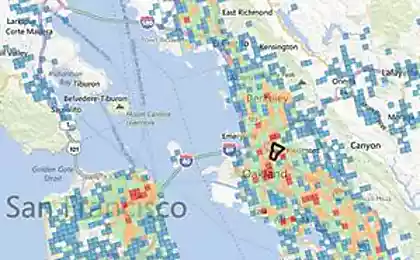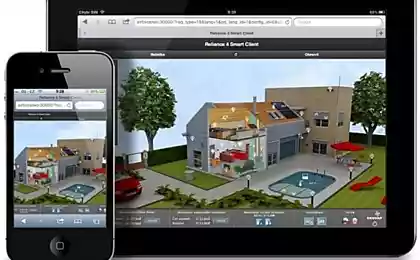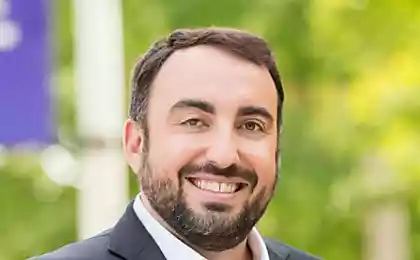1097
As mobile operators monetize data about your movements

As mobile operators are looking for new sources of revenue, the data about the location, movement, from where people live or work already sold to various companies and institutions.
Mobile operators have always had access to an unprecedented wealth of information about the movements of their users, but for many years they were used only for their needs - for example, for planning the deployment of networks or for marketing.
These data were sealed with seven seals. However, due to the fact that mobile operators are being forced to seek new sources of income, a growing number opsosov become involved in the systematization of data in order to create an efficient statistics - how do people actually moved into reality.
This type of information is more comprehensive than could be gathered any other application, for example, could help in the creation of new routes, roads and businesses - to acquire new customers, health care - to track the emergence of diseases. But even if we take all measures to protect anonymity, it still may be new risks for users' privacy.
Verizon Wireless, the largest US mobile operator with over 98 million subscribers, shows how such a program can be implemented. In late 2011, the company changed its privacy policy so that it can now share anonymous and aggregated data of subscribers to third parties. This made it possible to run his unit Precision Market Insights in October last year.
This recently launched program - a natural extension of what is already happening on the Internet, with websites to track clicks in order to get a detailed analysis of where visitors go and what they may be interested.
In addition, Verizon is working to sell demographic data about the people who, for example, participate in any event, how they got there or what kinds of applications they use when they come back. In a recent study, a similar event at the stadium, said a spokesman for the program Debra Lewis, Verizon showed that fans from Baltimore outnumbered fans from San Francisco three times on the Super Bowl. This information can be quite expensive and it would be difficult to obtain by other means, such as through surveys because not all people in the stadium tickets purchased on their own and therefore they could not be identified by your credit card and not all been downloaded app Super Bowl.
Other telecommunications companies are also exploring similar ideas. In Europe, for example, Telefonica has launched a similar program in October last year, and the head of the new division delivered a keynote speech at an industry conference & quot; "Big data monetization in telecoms" «in January.
"As long as it does not seem to me a big part of the telecom business, but it can happen," says Vincent Blondel, applied mathematician who worked on the study for the operator Orange. He studies the data volume of 2 billion records obtained from 5 million subscribers operator in Africa.
Such individual data, said Blondel, will not be available due to leakage, but they can be compared with other data from other sources and then can be obtained even if not intentionally, certain information about an individual or specific group of people. < br />
Already, some startups build their business by aggregating such information from various sources, knowing that the individual companies, even cell, this can not offer. Eg company AirSage, in Atlanta, founded in 2000, has spent nearly a decade seeking exclusive rights to install their equipment in two of the biggest 3 x US carriers in order to collect, anonymize, encrypt and analyze cellular signaling data bases in real time. < br />
Since then, when the company signed its second partnership agreement about a year ago (without specifying what kind of statement specifically refers), it handles 15 billion marks the location of each day and can calculate the movement of about one-third of the US population with an accuracy of less than 100 meters, said vice president of marketing Andrea Moe.
Because Subscriber mobile devices periodically observed at bases in different places, algorithms developed in the company are looking at patterns in such places - mainly for planning traffic flows and monitor road traffic.
For example, the software sees that device owners who spend time 9 to 5 in a business park, probably are at work, and thus engineering staff that monitors the main roads can predict traffic growth with secondary roads.
Other companies, in addition to data from the mobile operators, and start adding data from other sources. So the client is a small startup AirSage from San Francisco Streetlight Data, which recently raised $ 3 million of funding from venture capital, which includes Deutsche Telekom.
Streetlight Data buys the data from the mobile base, since the data and uses GPS, which can be used for market research. (Data from cellular networks cover a large number of people, but the data from the GPS, collected with the help of software services can improve accuracy). Today, many companies have collected a large database on population demography and behavioral grounds, using data from the US Census and they help sellers in the solution (for example) where to build a new store or how to build a marketing budget. But the software interactively from Streetlight Data is color coded maps of neighborhoods and roads and offers more practical information. It can bind demographics of people living near the highway and using constantly and distinguish it from a single visit, not only to provide information about people living in the area.
"If you are a retailer and are on the path of movement, people can pass you 600 times a year," says founder and CEO Laura Schewel, studying traffic and received a PhD in Berkeley.
"If they never visit you, this is a huge missed opportunity»
Work Streetlight Data shows why this kind of data can improve urban planning. One of the first customers was The Oakland Business Development Corporation, which wanted to attract businesses to the city, which has a reputation for poor and criminal, says Schewel. The data showed patterns according to which many rich people drove through the city from the suburbs of San Francisco and also showed that young people often visited Oakland to spend time in nightclubs.
The aim of the study was to convince the national networks is that they do not know Auckland well enough if they only look at the demographics of the local people and to show that it makes sense to open a store there and then help choose the perfect place for it.
Of course, all of these companies know that people want privacy, and they are struggling with the problem of leakage, and that the "anonymous" and "aggregate" data mean for people who are increasingly aware that they live with the tracker in your pocket. (Verizon Wireless incidentally enables its customers to abandon the program).
Companies seem to pay much attention to the protection of privacy. In the case Streetlight's received data and algorithms used to create patterns that help to compare the location space with other officially sources. The company claims that it can not track any individual device on a map, or target ads to any particular person with the data that she bought. Schewel also emphasizes that uses data of at least one day, month if not outdated and that the software does not make the statistics for the groups of less than 15 units.
The more important question, perhaps, is how people will be able to find a balance between the protection of privacy and the advantages that give their location data, or other mobile data about them more accessible. Research and experience show that, in practice, most of the people or against, or not so concerned about such an invasion of privacy.
Soon there will be a lot of applications such data. Some will seek to provide a platform for advertising in mobile applications and discounts.
Verizon for example as part of its program Precision Market Insights doing a pilot project, which allows subscribers to opt for (not just give up) CS is even more user information, including data web browsing and data mobile applications. In turn, subscribers could receive discounts and special offers on their phones from users interested in such marketing.
Also, this kind of data can help save the state budget. In California, the state government conducts an unusual experiment pilot licensing data obtained from GSP providers, instead of repairing constantly coming out of the building a network of sensors and detectors on the roads. Alexandre Bayen, a researcher at the University of Berkeley, which helps in the competition, said that soon there is a market, where participants will give governments access to mobile data.
Schewel, to which came the idea of creating soybeans companies Streetlight when she tried to think of a more environmentally friendly way to transport use, collecting data about who and how uses the roads, also sees his company in the longer term as the creator of cities more efficient by helping entrepreneurs to be placed closer to its customers and reduce travel time.
"Of course, the creation of" green "start-up, the basic idea of which is fuel economy - it is not scalable idea," she says. "But what about the startup engaged in marketing analytics and have as a side effect, giving fuel economy by reducing the mileage? I think that this is the most effective way to become an agent of change »
Source: geektimes.ru/post/244338/
Virtual reality simulator Toyota teaches us not to write SMS behind the wheel
The sensor in the human body will report on hunger























